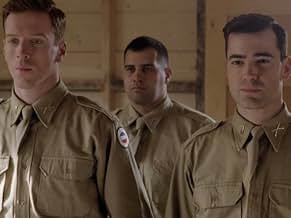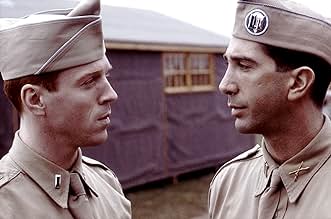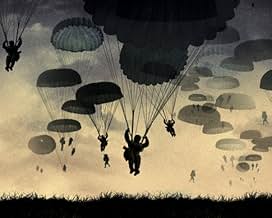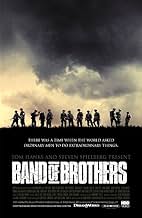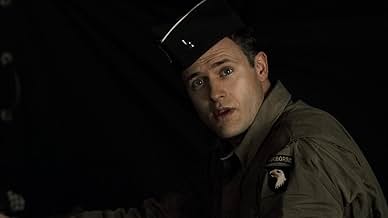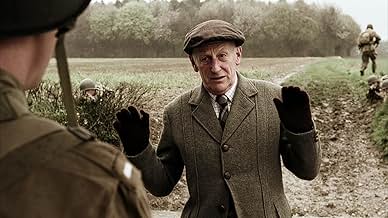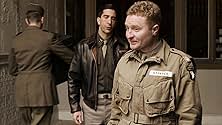Easy Company goes through training under the leadership of a captain who relentlessly pushes them to their limits but may be limited as a leader in the field.Easy Company goes through training under the leadership of a captain who relentlessly pushes them to their limits but may be limited as a leader in the field.Easy Company goes through training under the leadership of a captain who relentlessly pushes them to their limits but may be limited as a leader in the field.
- Director
- Writers
- Stars
- Wayne A. (Skinny) Sisk
- (as Philip Barrantini)
- Director
- Writers
- All cast & crew
- Production, box office & more at IMDbPro
Storyline
Did you know
- TriviaSome scenes showing Capt. Sobel's incompetence and pettiness actually happened. Sobel had difficulty reading a map, which led to his getting lost many times in the field. He was also tricked by 'Maj. Horton' into cutting a wire fence, thereby releasing cows. In that instance, the only difference between what happened in real life and in the series was-that the actual event happened at night. Sobel also ran around exercises and rifle ranges with a leather aviation jacket. He went through the men's footlockers and confiscated allege "'contraband" and scattered their possessions. Sobel would also pick on soldiers, gigging them for the smallest of infractions or ones he just made up, like having dirty ears. The feud between Capt. Sobel and Lt. Winters, where the former altered the time of inspection and charged Winters with failure to carry out orders, did play out as shown. What was left out was, that Strayer and his staff found a legal loophole that got Sobel's charges set aside. Sobel followed it up by charging Winters with failure to ensure that the soldier cleaning the latrine was not properly shaved. That charge was also set aside but it also got the mutiny going. There were other acts that were not shown in the series; on a night exercise, Sobel and 1st Sgt. Evans decided to teach the importance of soldiers guarding their weapons as they slept by stealing about 50 rifles from sleeping troopers. Come morning the two assembled the company, chastising them for their failures. They were interrupted by angry members of Fox Company. The two thieves got lost, went into the wrong camp and stole the rifles from the wrong men. In another night exercise, Easy Company was lying in ambush. A wind came through the woods and ruffled the branches, leaves and grass. Sobel panicked and began shouting, "Here they come!'", thereby giving away Easy's position.
- GoofsDuring "Curahee" in the scene where Easy Co. is receiving a lecture, there are various German weapons on the wall. One of them is an Stg 44, not used in combat until 1944. Thus, it is impossible that the Americans had captured one in 1942-43.
- Quotes
George Luz: [reading aloud Col. Sink's announcement of the impending jump into Normandy] "Soldiers of the Regiment! Tonight is the night of nights. Today, as you read this, you are en route to the great adventure for which you have trained for over two years."
Bill Guarnere: So that's why they gave us ice cream.
Modern television evolved from five shows: Twin Peaks in 1990, which began the water cooler effect (for those unfamiliar with the term, it refers to employees at a workplace gathering around the office water cooler to discuss the shocking developments of the previous night's episode, accompanied with story predictions and personal opinions); The Sopranos in 1999, which gave audiences and, more importantly, networks, a sense of what television could be if taken seriously; Band of Brothers in 2001, which visualized the budget and ambition needed to progress the medium into a deeper sense of reality rather than possibilities; Lost in 2004, which solidified the format of a serialized drama quite like no other series before it, perhaps maybe other than Twin Peaks; and, finally, Mad Men in 2007. Mad Men used Lost's serialized nature on a more personal level. That led to AMC greenlighting Breaking Bad. As everyone knows, Vince Gilligan's engrossing series about an overqualified high school chemistry teacher entering the drug trade kicked off the "current" wave of television program: the "New Golden Age."
It's impossible to discuss Band of Brothers' premiere episode without first discussing the crucial facts surrounding the medium's recent history. Without this show, television would be a very different place. Therefore, after nearly two decades, Band of Brothers has remained highly regarded among film and television enthusiasts. It had a whopping budget of $125 million for a single season, with each episode costing approximately $12.5 million, and because it had two great minds behind it, there was little that could go wrong; even if the series did flop, which was unlikely, it would be a lesson learned for television, much like the grave warning of executive interference brought forth in the second season of the aforementioned Twin Peaks.
So, is "Currahee" a remarkable episode? This is probably the most basic chapter of the series, which is saying a lot, given how close one feels to the characters shown here for a mere hour. David Schwimmer plays Captain Hebert Sobel to perfection. He is a tough individual, for sure, but is slightly challenged when placed outside of his controlled environment. Nevertheless, as evidenced in the opening minutes of "Currahee," the company benefited tremendously from his hardline policies and strict personality: without Sobel, the company would be unprepared to jump for D-Day. As the episode progresses, it becomes evident that this is what Sobel had been preparing the company for, but the growing resistance to his methods also proved that he wasn't a capable leader in every regard, as he had little admiration, and hardly any sincere respect.
David Schwimmer isn't alone in his acting chops. We also receive fine performances from Damian Lewis, who plays the main character of the series, Richard "Dick" Winters, and from Ron Livingston, who plays his best friend and frequent confidant, Captain Lewis Nixon. The cinematography of "Currahee" is something to behold as well, especially when it comes to what television has offered as the status quo in the past. The musical score is brilliant as well. With those things in mind, the closing shots of this episode will send goosebumps tingling down the spine, so be prepared.
So, while "Currahee" isn't some grand spectacle, it is certainly a great way to kick things off. It has several excellent moments of character development. The interactions between Winters and Sobel are especially noteworthy. Keep an eye out for Winters dissing Sobel by not looking at him during a Currahee run. Sobel scoffs at first as Winters ignores his superior (Sobel is under the impression that the two have some sort of friendship built out of respect), but then nods in understanding, plays it cool, and rejoins the group. The tensions between the two sees a zenith of sorts as Sobel tries to turn Winters' own men against him. You'll get no spoilers here; you'll have to see what resolution unfolds, if any, because of Sobel's personality and leadership quarrels. Dialogue is a strong suit for this show too. "Currahee" sports a fine amount of solid writing. With these things in mind, hopefully those who are turned off by the slow and deliberate pace of this episode won't dismiss the series altogether.
- TheDearHunter1878
- Apr 20, 2018
- Permalink
Details
Contribute to this page


